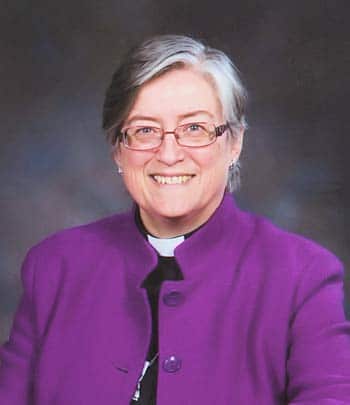In the Rev. Laurette Glasgow’s world things may always be changing, but the basic realities tend to stay the same. As special advisor for government relations for the Anglican Church of Canada since March 2012, Glasgow has seen her position evolve as both she and the church learned what it was to have an ‘ambassador’ to the federal government.

“Sometimes it grows organically,” says Glasgow, “and that’s what we always thought… that two years down the road we’d look back and say ‘it’s a bit different than what we thought it was.’ But the fundamental elements are the same, the fundamental elements of relationship building, of building bridges, or interpreting the church to power, and interpreting power to the church.”
This is not Glasgow’s first time in an ambassadorial role, nor her only experience working with the government. She spent 37 years working for the federal government in various ministries and departments-Communications, Treasury Board, Finance, Foreign Affairs, and International Trade. Twenty-six of those years were spent in diplomacy, including stints as the ambassador to both Belgium and Luxembourg, and as Canada’s Consul General in Monaco.
“As an ambassador I think one of the best things I learned was that you have to be an interpreter of your country to the country that you’re accredited to… And I think in many ways my role is like an ambassador for Christ. … It’s a bit of a diaconal role—how you explain the church … to the powers that be, and how you help the church understand where the government is coming from.”
So just what shape does this ambassadorial interpretation and relationship-building take? “It’s about establishing contact, having conversations, taking advantage of people coming through to be able to address certain issues.”
When it comes to interpreting the church’s priorities to the government, Glasgow gives the example of her work in partnership with the Canadian Foodgrains Bank—an agency dedicated to ending world hunger through food assistance and security, owned by 15 Canadian churches and church-based agencies. They worked together to coordinate 36 separate and simultaneous visits by teams of four people each, all across Parliament Hill. Their objective: to talk to politicians about the work the Foodgrains Bank is doing to alleviate poverty and hunger in the global south, and to express the need for continued government funding and support.
The traditional tools of government contact—such as writing a letter to the Prime Minister—still have their place, but are not always effective. Glasgow’s alternative is to go directly to the policy makersduring the process-to meet and talk to with them, and to listen. “I think that there’s a reasonable openness to it. If you make it worth their while and you’re not there to harangue people but rather to have a conversation. To go in, and to listen. I think we have to learn how to listen.”
On interpreting the government to the church, Glasgow gives the example of budget day. “Usually on the same day I try to provide to the Primate and our senior leadership a sense of ‘well how does this budget touch upon our priorities? Is this good, bad, or ugly? What kind of direction is this taking us?’
“I’ve gotten some feedback from people who have found it very helpful because they don’t have time to plow through 500 pages, and I’m able to scan through it and give them my experience. When a few weeks later somebody’s policies are being applied and interest groups start appealing to the church … we’ve got a little bit of forewarning.”
Although Glasgow works for the national church in her government relations role, she continues to serve in the Diocese of Ottawa. She is the honorary assistant at the Church of St. Bartholomew in New Edinburgh-preaching monthly, celebrating the Eucharist and teaching-and is involved in diocesan council as a member of the governance committee, and chair of the development subcommittee.
Interested in keeping up-to-date on news, opinion, events and resources from the Anglican Church of Canada? Sign up for our email alerts .
